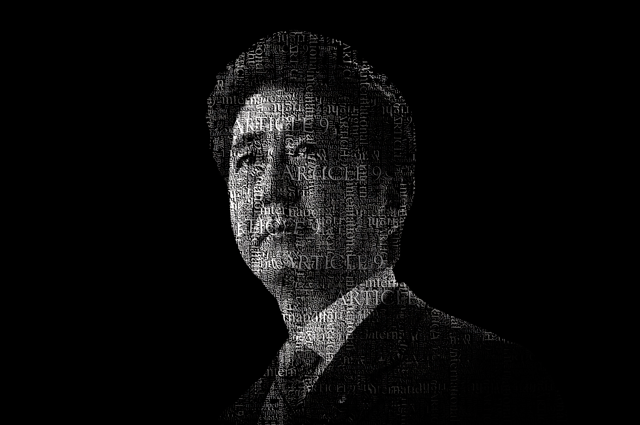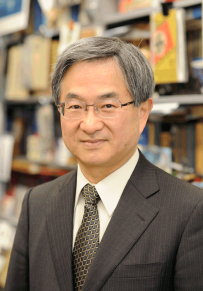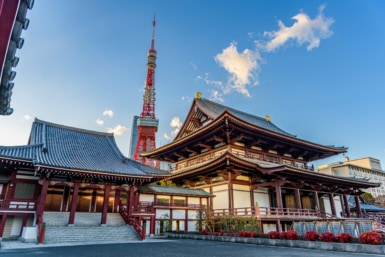Two voices weigh in on Prime Minister Abe’s military move.
As the 70th anniversary of the end of World War II approaches, Japan also stands on the verge of substantially changing its military capability. Article 9 of the post-war Japanese Constitution states that the country is not allowed to engage in war or establish armed forces. However, the Abe administration has recently put forth a series of bills that would extend Japan’s powers to engage in armed conflict. The bills, which include a reinterpretation of Article 9, have already been approved by the lower house of parliament, and as of the time of publishing, are being debated by the upper house. With these events in mind, we spoke with two academics who stand on different sides of the issue as they weighed in on the historical background of the Constitution and Article 9, the limits of their interpretation, and Japan’s attitude towards its neighbors in Asia.
Asaho Mizushima
Dr. Asaho Mizushima is a Professor at Waseda University’s School of Law. Formerly a professor at Sapporo Gakuin University and Hiroshima University, Mizushima is an expert in the field of constitutional law, legal policy theory, and peace studies. He is currently doing research on post–Cold War peace and security and the theory of constitutional reform.
What do you think about the approach that the LDP has taken with this section of the defense bills?
Asaho Mizushima: The LDP approach is completely wrong. Article 9 in the Japanese Constitution entirely denies the formation of a military or war potential. However, 61 years ago, the Japanese government approved the Self-Defense Forces (Jieitai), saying that Article 9 doesn’t waive the inherent right to self-defense, and it allows the government to possess the minimum level of actual force needed to exercise that right. In other words, the government explained that since the Self-Defense Forces are not an army, having one does not violate Article 9. This is the key logic that they have used to justify the existence of the Self-Defense Forces until now.
It is only if another nation attacks Japan that she may counterattack against the enemy with the Self-Defense Forces. This is called an exclusively defensive posture, or Senshu Bouei. However, if the right to collective self-defense is permitted, if any one foreign country is under attack, Japan is allowed to counterattack even if it was not directly attacked. This contradicts the very reason that the SDF was explained as constitutional. The SDF is minimum level of armed force needed to defend Japan, not to fight for other countries—the Japanese government has been saying this for more than six decades. Nevertheless, last year, by a single cabinet decision, the Abe administration changed the interpretation of the Article 9 to permit the right to collective-self defense [in July 2014; the current defense bills are based on this interpretation]. This is an outrageous breakaway from the theory and practice of the past 60 years.
Do you think there is a possibility that Article 9 will be changed?
Yes, but it is very low. I think that Mr. Abe’s hasty and loose measures to expand Japan’s military activity will not increase the number of revisionists. To the contrary, more and more citizens alarmed by his strong-arm approach are raising their voices to support the Constitution.
According to several opinion polls, 20 to 30% of people agreed with the idea that it is hard to protect our country without a proactive military. But this time, Abe’s Cabinet has not changed the Constitution; rather, it has only changed the interpretation of the Constitution. In effect, our political leaders are saying that, without changing the Constitution, they can turn the SDF into a full-fledged military through reinterpretation.
What do you make of the idea that the defense bills are intended to help protect Japan?
After the war, most Japanese people have seen that, thanks to Article 9, there have been no more wars, and that is why they gladly welcomed [Article 9]. It’s been almost 70 years [since the establishment of the Constitution], and you could see Article 9 in one of in two ways. One is a means of control from the outside world that prevents Japan from starting a war. The other is to see that Japan has been involved in world peace without influencing military power actively—by accepting the fact that the Article 9 is a means of preventing Japan from starting wars. To me, it is this second one that is most important.
“I think the current Abe administration is the worst aggravator since the War.”
Seventy years after the end of World War II, what do you think Japan’s attitude towards its neighbors should be?
Japan has been contributing to world peace for more than 70 years. Nonetheless, some of the people in the current government have…said “what Japan did was right—[the] war was right.” [This would stand against the spirit of official statements of apology, such as those by former Prime Minister Tomiichi Murayama and former Chief Cabinet Secretary Yohei Kono] I think Mr. Abe is one of them, and there are people in China and Korea who say that Japan has not been apologizing enough….Since the end of World War II, it has been put into the Constitution that we can not wage war, and for 70 years we have been contributing to peace. We should be more confident and proud of that.
…
[But] It is important to address that Japan is showing our apology in the constitution after the war—so we will not do the same thing ever again. It is necessary to have an apologetic heart and an understanding of what Japan did—I think this is something that we are lacking.
The subject of education—particularly textbooks—has been a major issue between Japan, Korea, and China. What role do you think education can play in improving relations?
For Japan, we should admit the fact that it is important for the Japanese government to teach all the facts related to our invasions during the war. At the same time, actually the UK and other nations were also engaged in colonialist policies. Therefore, instead of saying one country is right, I think what we really should do is to share our history together—even making a textbook together. If we make more effort on this, each country will admit the facts about what each country did. And to learn, it would be ideal to use a common textbook in Asia—this would definitely enhance our mutual understanding.
How would you get those three countries to agree on how this history should be taught?
I think the Six-Party Talks (Rokkakoku Kyougi)—which were created to address the issue of the North Korean abductions of Japanese citizens and which are now on hold—is the kind of place where these kinds of talks should be started again. During the [Yukio] Hatoyama administration, there was a time when an East Asian Community (Higashi Asia Kyoudoutai) was being formed. Even good relations with China were being established. The Abe administration is stopping everything. [Mizushima adds that aggression began with Former Tokyo Governor Ishihara’s plan to purchase the disputed Senkaku Islands under the Noda administration.] Mr. Abe is pushing forward a reassessment of the International Military Tribunal for the Far East War Criminals Tokyo Trial (Tokyo Saiban). Abe is evaluating these trials, including [those of convicted war criminals who are honored at] Yasukuni Shrine. This of course can be a trigger for a war between Japan and other Asian countries. Therefore, it is best for Mr. Abe to resign. Previous administrations got along well with the Korean government, even though they were from the LDP. I think the current Abe administration is the worst aggravator since the War.
Translation by Yuna Uemaru
Toshio Nishi
Dr. Toshio Nishi is a research fellow at the Hoover Institution and a Professor at Reitaku University. He has worked as a foreign correspondent for NHK Journal, taught previously at Nihon University, and his best known book is “Unconditional Democracy: Education and Politics in Occupied Japan, 1945–1952,” which was published in Japanese as “Kuniyaburete MacArthur.”
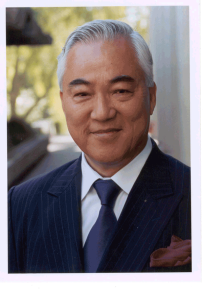 What’s your reaction to the defense bills currently going through Parliament?
What’s your reaction to the defense bills currently going through Parliament?
I was studying at the National Archives and I read declassified papers that had just been opened up for the first time. I went through so many documents and it was shocking: those papers, telegrams, and secret reports [Between members of the U.S. administration] had no abstract language. There was no mention of peace, or harmony, or humanity. It was almost all virtually “Can I use him? Should he be kept alive, or hanged?”
[Five years after the establishment of the Japanese Constitution, including Article 9] The Korean Peninsula starts boiling in red. MacArthur panics: he hates the Communists, and he sees that Japan, his baby, is defenseless. So he says, at the New Year’s message to the Japanese people, “Article 9 did not mean that you can’t defend yourself.” And that was the beginning of the Self-Defense Forces. MacArthur orders [Prime Minister] Yoshida to establish the Marines and Air Force.
So the first reinterpretation came from the guy who wrote it in the first place [Nishi places most responsibility for the Constitution in MacArthur’s hands]. But there’s also the question of letter and spirit of the constitution. The [initial] spirit was no defense whatsoever.
Really, I expected Abe to charge at Article 9. But instead of going right at it, he went with Shuudanteki Jieiken [Collective Self-Defense]. I was really disappointed in him. This way, he doesn’t have to touch it….If he were to take the issue head on, he would lose the election, but he would leave his glorious name in the history of Japan, because now a Prime Minister who was so popular charged at [the issue] like a Don Quijote and died, lost the position. But if that happened, this heavy iron door of Article 9 would be cracked.
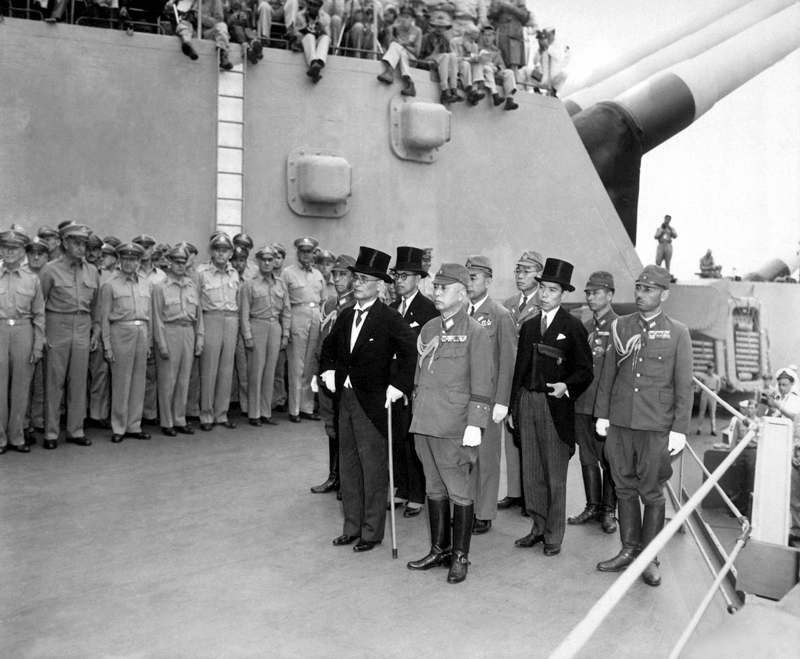
Signatories of the Japanese surrender aboard the USS Missouri, September 2, 1945 (Wikimedia/Public Domain: http://bit.ly/1OZ8Sh4)
Only my generation knows the poverty of living during and after the war. Eighty percent of the Japanese population alive today never knew anything about war. What they know is the indoctrinated version of that war. That indoctrination started with Article 9 and peace education. But we didn’t earn that peace; we earned the crumbs branded peace by the American forces. So we became essentially brilliant, hard-working, domesticated animals of labor.
But now we have the current generation who has seen [violence] on screens everywhere: so many wars, and they never stop. Or we have seen people like Kenji Goto [the Japanese journalist who was murdered in Syria by terrorists from ISIS] be killed. When we think of war, we can imagine the most horrible scenes in our head, and they are all true. So I understand why there is such a strong voice of protest against the Prime Minister. And I think the Prime Minister made a big mistake of not explaining: not taking a whole year! It is that important, and Abenomics is not. This is something that is directly connected to our soul, to our lives, to our future. If we don’t like Article 9, then let’s debate it. Mr. Prime Minister, you lead the debate.
But what would be the purpose of the unconditional ability to have an army? It wouldn’t be to go and fight wars overseas, so what aim would it serve?
From 1945 to 1952, American occupation forces were in Japan, so no one was going to even think of attacking us. In 1952, we become independent. The White House says that occupation forces can leave. And the Pentagon says, “what are you saying? Leave Japan? Are you nuts?”…If Yoshida, Aso-san’s grandfather, agrees to the stationing of American forces, we will have an agreement in San Francisco. And Japan had a hard time—the worry was that America would stay forever. There was a big voice in Japan saying that there should be a peace treaty, with Russia included, and Mao Tse-Tsung included…Yoshida had to argue against people who believed that. Now Yoshida had to think, “if I sign that San Francisco Peace Treaty, and after that, the Mutual Defense Agreement with the United States, then I’m no longer the big person; I become a servant to America.” So he agonized over it, but the clock was moving towards independence, and the mood was towards independence. And in the end, Yoshida gambled, and acquiesced. That’s how independence was given. The U.S. is stationed here now, in the same place as it was 50 years ago.
“People talk about Article 9, and say that they are peaceful and that they enjoy peace because of it … If you really believe in this peace, ask the Americans to leave, and see what happens.”
After Japan started becoming rich, we started paying—per year—about $6 to $8 billion. From the perspective of our cultural heritage, it’s yakuza protection money, something that we’re very familiar with! So the hypocrisy and dirtiness of Japanese people here is that people talk about Article 9, and say that they are peaceful and that they enjoy peace because of it. But I say, it’s because of our bodyguards to whom we pay $6 to $8 billion a year. If you really believe in this peace, ask the Americans to leave, and see what happens.
When I say Japan should defend itself, I’m thinking very simply. A military force, and submarines with defense capability. That’s it. But the possibility with Abe-san’s collective defense is that the United States might ask for Japan to go together to the Middle East, or Chinese shores. And that’s something that many Japanese are legitimately worried about. I am too. I am worried.
One of the issues among Japan, China, and Korea is the subject of history. Is the Abe administration’s unwillingness to acknowledge wartime events—or revise them out of textbooks—a wise move?
I think it’s stupid on Japan’s side. “What are you thinking; that was war!” Obviously something horrible happened. It happens everywhere, and it happens in every war. Humans become non-human. Of course it happened with the Japanese forces. But the problem is that some Prime Minister apologizes there, lots of businessmen apologize there, and the main apology is Article 9. Nothing tops that. We are defenseless….And younger people are starting to get sick of it [the apologizing]. I have students who ask me, “how should we Japanese apologize?” And I say, “I don’t know.” They reply: “If we apologize this way or that way to Korea, to China: would they forgive us? I think they should tell us how we should apologize, write the sentences for us.” … It is an apology fatigue. We don’t know what to do. And our hunch is that they will want apologies for another 100 years.
Updated On May 21, 2017

